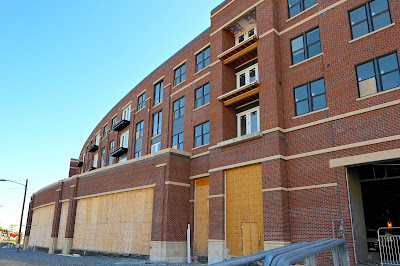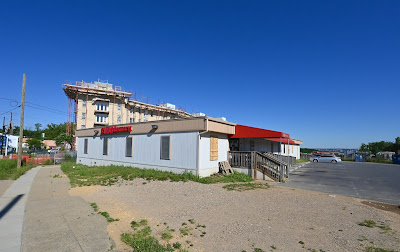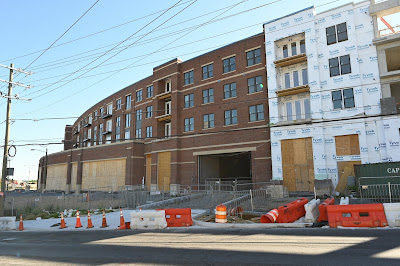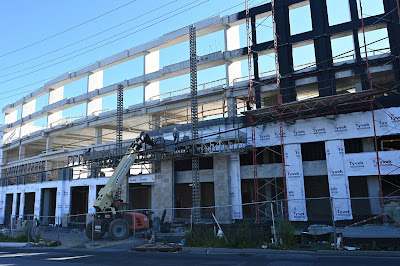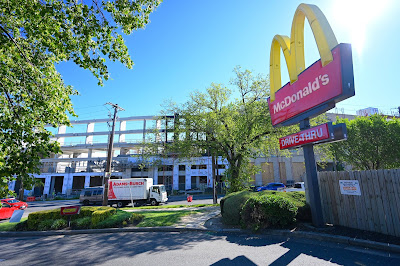Washington D.C. retail and real estate development news
Thursday, June 11, 2020
Skyland Town Center's Phase One
Labels: Rappaport, Skyland, Torti Gallas, Ward 7, WC Smith
Washington D.C. retail and real estate development news
Monday, January 16, 2012
Today in Pictures - Skyland
 While the District government struggles to rid Skyland of its owners and tenants in order to make way for a more contemporary shopping destination by turning it over to developer Rappaport, the outdated shopping center looks ever more dilapidated and forlorn.
While the District government struggles to rid Skyland of its owners and tenants in order to make way for a more contemporary shopping destination by turning it over to developer Rappaport, the outdated shopping center looks ever more dilapidated and forlorn.











Washington D.C. real estate development news
Skyland Struggles Towards Uncertain Timeline
Labels: Rappaport, Skyland, Southeast, Walmart
 the specter of a
the specter of a  Wal-Mart vs. Safeway showdown over a decade-old exclusivity covenant having receded, the District can get back to resolving the many other issues standing in the way of the Skyland redevelopment in Southeast DC, a top priority of Mayor Vincent Gray’s embattled administration. But can Skyland overcome the many hurdles it faces?
Wal-Mart vs. Safeway showdown over a decade-old exclusivity covenant having receded, the District can get back to resolving the many other issues standing in the way of the Skyland redevelopment in Southeast DC, a top priority of Mayor Vincent Gray’s embattled administration. But can Skyland overcome the many hurdles it faces?

 follow through on his threat to block Wal-Mart's four other stores in the District if they don't put one in Skyland?
follow through on his threat to block Wal-Mart's four other stores in the District if they don't put one in Skyland?
“The Skyland project is definitely gaining momentum, and the Mayor has made this a priority,” said Sheryl Simeck, Vice President of Marketing and Communications at Rappaport. “But it is still too early in the process for us to be able to supply construction dates," (despite Mayor Gray's prediction it would break ground last year.) "The District continues to work on resolving the outstanding legal issues involving eminent domain. Development cannot start until these last few issues are resolved.” At this time, no one is prepared to say when that will be.
Friday, March 12, 2010
Skyland's Supreme Challenge
Labels: DMPED, Marshall Heights, Rappaport, Skyland, Torti Gallas, William C. Smith
 Real estate development is sometimes an agreeable collaboration, sometimes a struggle, and all too often a wordy brawl, but seldomly is it constitutionally challenging. But that may well be the case in southeast DC's Skyland Town Center project, now in its 8th year of development. What began as a plan to redevelop a needy southeast neighborhood, a benefit most agreed was overdue, has morphed into a property rights battle that tests the U.S. Supreme Court's decisions on property rights.
Real estate development is sometimes an agreeable collaboration, sometimes a struggle, and all too often a wordy brawl, but seldomly is it constitutionally challenging. But that may well be the case in southeast DC's Skyland Town Center project, now in its 8th year of development. What began as a plan to redevelop a needy southeast neighborhood, a benefit most agreed was overdue, has morphed into a property rights battle that tests the U.S. Supreme Court's decisions on property rights.
Eight years ago, the National Capital Revitalization Corporation (NCRC) began planning a makeover of the strip mall, proposing 450-500 residential units and 280,000 s.f. of retail at the intersection Alabama Avenue and Good Hope Road, an area that saw none of the rejuvenation that occurred downtown over the last decade. The District-funded NCRC recognized the spot as a bullseye to spur development, one where private industry alone might not be tempted. The choice seems apt; shuttered beauty salons accompany a check-cashing outlet, a Discount Mart offers faded displays in the window, and the mismatched storefronts are united as much by their nearly-matching green awnings as by their peeling paint and disrepair. On a warm day, car traffic is heavy but the few pedestrians seem more inclined to linger on one of the park benches in front than patronize the stores.
 Promoters have a vision: "A 20-year old dream, conceived by Ward 7 residents when this 16-acre site in southeast Washington, D.C. was declared a redevelopment zone in the late 1980's...will transform a disjointed retail area with limited offerings into a cohesive, well-designed, prominent living, shopping, and gathering place." Planners presented at a meeting to the ANC in February, promising a new retail experience for southeast: concentrated retail, multi-family residences, three above-ground parking garages, a 5-story streetfront presence, and reducing vehicular access points for less interrupted pedestrian traffic. As a bribe to locals, builders will throw several million dollars at homeowner counseling services, retail build-out subsidies, park improvements, sidewalk and road enhancements, and job preparedness.
Promoters have a vision: "A 20-year old dream, conceived by Ward 7 residents when this 16-acre site in southeast Washington, D.C. was declared a redevelopment zone in the late 1980's...will transform a disjointed retail area with limited offerings into a cohesive, well-designed, prominent living, shopping, and gathering place." Planners presented at a meeting to the ANC in February, promising a new retail experience for southeast: concentrated retail, multi-family residences, three above-ground parking garages, a 5-story streetfront presence, and reducing vehicular access points for less interrupted pedestrian traffic. As a bribe to locals, builders will throw several million dollars at homeowner counseling services, retail build-out subsidies, park improvements, sidewalk and road enhancements, and job preparedness.The project was initiated during Mayor Williams' term, but the Fenty administration has gotten squarely behind the project, helping bring together the parties and promoting the project. The Council has even offered a $40 million Tax Increment Financing (TIF) package to provide gap financing to the team, a consortium including Rappaport Companies, William C. Smith & Co., Harrison Malone Development LLC, the Marshall Heights Community Development Organization (MHCDO) and the Washington East Foundation. The Feds, for their part, threw in $28m of funding to show their support. Even the ANC, which usually love development as long as its not in their district, voted to support the project.

With all the economic incentives and mutual bonhomie, what could stop such a beloved juggernaut? The people who own the land. A not-so-small detail in the rehash is that neither the development team nor the city owns most of the property; private owners (originally 15, predominantly retailers) still claim title to the land. And with concerns about displacement and the possibility that once the site is emptied developers will not have financing to build up again, owners fret that selling out means closing down, for good.
The District government is sympathetic, but not very. In view of the greater good for the area, the economic development that will ensue and tax revenue that will one day flow, District planners have opted to proceed with or without the owners' approval. In May of 2004, the District passed "emergency" legislation authorizing NCRC to use eminent domain proceedings - where the government determines and pays a fair market value and takes over the land - to acquire the 40 parcels it needed "in order to show the commitment of the D.C. government to the project." As the argument went at the time, if the District could not pull together a united front, financiers and an anchor store would be hard to come by.
 That gave gastric reflux to at least some of the owners, who filed a counter suit to prevent the taking. The owners had two primary arguments: that the original PUD filed with the Zoning Commission was filed by a group that did not include the owners - an issue that is still outstanding - and that the eminent domain proceeding was unconstitutional, i.e., that the land was being taken for private use, not "public use" as required for eminent domain.
That gave gastric reflux to at least some of the owners, who filed a counter suit to prevent the taking. The owners had two primary arguments: that the original PUD filed with the Zoning Commission was filed by a group that did not include the owners - an issue that is still outstanding - and that the eminent domain proceeding was unconstitutional, i.e., that the land was being taken for private use, not "public use" as required for eminent domain.At this point forgive us for a brief Constitutional digression. The 5th Amendment to the Constitution reads, in part: "nor shall private property be taken for public use, without just compensation." Characteristically simple language for the foundation of U.S. law, but one that has caused recent debate. Until recently, it was obvious that sole authority for snatching land had to spring from a "public use" (building a new road or sidewalk, laying electric cables, forming a park, or even laying a railroad which served without exclusivity) - one where the government could take the land to further provision of a community service.
All that changed dramatically in 2005, when the U.S. Supreme Court issued its decision in Kelo, et al. v. New London, CT, et al. In the Kelo decision, the city of New London created a development plan for a waterfront neighborhood around an upcoming Pfizer research center. The plan was for parks, office space, retail and parking that would enhance the Pfizer site, one that was “projected to create in excess of 1,000 jobs, to increase tax and other revenues, and to revitalize an economically distressed city..." Some lifelong homeowners, however, resisted giving up their waterfront homes, so the city and a private entity called the New London Development Corporation (NLDC), used eminent domain proceedings to oust the residents.
The Court found for the city, arguing that although much of the space would not go to "public use", the Court decided it "had long ago abandoned any literal requirement" for reading the 5th Amendment, literalism being "impractical given the diverse and always evolving needs of society." So much for the 5th Amendment. The court abandoned the "public use" requirement in favor of a "public purpose" requirement; in other words, if the local government found a generalized benefit of some sort (such as "economic development") to the community, it was free to authorize the seizure of one party's land by another party. In addition to getting value-enhancing development next door, Pfizer received corporate subsidies to encourage it to build, while the shore-front owners were soon evicted and had their homes razed.
Kelo remains the Court's official position, and the Skyland project has nearly identical circumstances. But owners here see even less public use than in Kelo - no parks or public waterfront - distinctions that helped the court reach its decision. With the Court having lost Justice Souter, a key liberal vote in the 5-4 opinion, another look at the same issue might find a distinction in the circumstances that warrants a different outcome. (Conservatives, more furious with Souter than ever after this decision, later proposed an eminent domain proceeding against his private New Hampshire home for the "public benefit" of turning his family home into a museum dedicated to individual liberties and the study of the Constitution. Property rights activists used the decision to launch national speaking tours).

While the ruling is a bitter pill to retailers at Skyland, the worse aspect may be the knowledge of what took place after the decision. In New London, the city removed the homeowners and bulldozed historic homes, only to have the development plan fail for lack of financing. The former neighborhood remains flattened and unused. Pfizer later announced that it will pull out of its research center, just as its tax incentives reach their 10-year expiration.
Dana Berliner, Attorney with the Institute for Justice, was co-counsel on the Kelo case. In a conversation with DCMud, Berliner said the instance of eviction without subsequent development is a very common one. "What you are talking about here [at Skyand] is really speculative. Its a big development in a difficult part of town...that project could easily end up destroying the jobs that already do exist at Skyland. They could spend tens of millions of dollars and end up with nothing. Now, the project actually does employ people and raise tax dollars." Zina D. Williams, ANC Commissioner for ANC7B is more sanguine. "We have worked carefully with the developers to ensure there will be a space for the old tenants." Will the developers have the money to proceed with construction? "Yes, they definitely do. Rappaport and the development team have been working with assisting [owners]. ANC7B and the developers have been working very hard to accomplish what's best for the project; we are confident this project will go forward, we definitely support the development team."
In the wake of Kelo, many states revised their eminent domain laws to prevent such abuse, but the District did not. Elaine Mittleman, an attorney representing several of the parties in litigation with the District and aware of the Kelo fallout, refutes the notion that owners and tenants have been well cared for, and notes that this development is "highly speculative." Mittleman believes the developers have neither sufficient financing nor any substantial tenants, despite having previously teased the community with the promise of a Target. Representatives at Target have repeatedly denied they have any plans to open a store there, and the Skyland website says only that "the site is being marketed to prospective tenants."
Mittlement notes a change for the worse once NCRC was abolished and negotiations shifted to District attorneys, claiming that the District has never negotiated in good faith with the current owners, some of whom have come to agreements on a buy-out, only to have the offer reneged when the District took over from NCRC. But others may have it still worse. "While the owners have a right to 'just compensation,' tenants don't have such rights and have never received an offer to be made whole...and while homeowners must be relocated, businesses have no such right, and the District has done very little to help them."
The Mayor's office says only that "there are several outstanding legal issues associated with the project that have complicated the development process, but the District is working closely with the development team...to accelerate the pre-development work so the project moves on a parallel track with the legal process." Mittleman contends that fighting eviction during a recession has pushed several of her clients close to bankruptcy. "Some of the business that are now shuttered were operating when the this plan became known, this process has already forced some to close." Berliner supports that contention. "Many, if not most, condemned business do not reopen. They almost never get enough to start over" she said, citing the Nationals Ballpark as an example of eminent domain that cost alot more and produced less development than predicted.
Councilmember Kwame Brown, who may have the last word on the subject, told DCMud that property owners are at fault for not listening to the community and allowing their businesses and Skyland to become blighted. Brown said neighbors want to be able to shop in their community, but have had to watch as other neighborhoods throughout the city have been redeveloped, some of which came about through eminent domain. "The community is sympathetic toward the owners, but it's hard to attract an anchor tenant when you are mired in a lawsuit...We are going to move forward and get this done. We will develop Skyland shopping center."
Washington, DC real estate development news
Thursday, October 09, 2008
Skyland Readying for Take-Off
Labels: Rappaport, Skyland, Smith and Co, Southeast, Torti Gallas
 Despite years of false starts and a finicky housing market (to put it delicately), the long in-development Skyland Town Center in southeast Washington D.C. is now pacing itself for a 2012 delivery. Well, maybe. Described by the 5-member development team - which includes the Rappaport Companies, William C. Smith & Co., Harrison Malone Development LLC, the Marshall Heights Community Development Organization (MHCDO) and the Washington East Foundation - a
Despite years of false starts and a finicky housing market (to put it delicately), the long in-development Skyland Town Center in southeast Washington D.C. is now pacing itself for a 2012 delivery. Well, maybe. Described by the 5-member development team - which includes the Rappaport Companies, William C. Smith & Co., Harrison Malone Development LLC, the Marshall Heights Community Development Organization (MHCDO) and the Washington East Foundation - a s a "prominent living, shopping and gathering place," the $285 million Skyland project aims to deliver more than 700,000 square feet of mixed-use development, mostly in the form of new housing.
Located at the intersection Alabama Avenue & Good Hope Road SE - across from the present location of the Good Hope Marketplace, the Skyland Town Center will boast 280,000 square feet of retail space and 460,000 square feet of residential housing. Of the roughly 475 residential units included in the project, 20% of the units will be available to families earning 80% of the Area Median Income (AMI) or less, 10% will be reserved for residents making 120% AMI. Torti Gallas & Partners also designed 21 single-family townhomes and three above-ground parking garages to serve the development.
s a "prominent living, shopping and gathering place," the $285 million Skyland project aims to deliver more than 700,000 square feet of mixed-use development, mostly in the form of new housing.
Located at the intersection Alabama Avenue & Good Hope Road SE - across from the present location of the Good Hope Marketplace, the Skyland Town Center will boast 280,000 square feet of retail space and 460,000 square feet of residential housing. Of the roughly 475 residential units included in the project, 20% of the units will be available to families earning 80% of the Area Median Income (AMI) or less, 10% will be reserved for residents making 120% AMI. Torti Gallas & Partners also designed 21 single-family townhomes and three above-ground parking garages to serve the development.  Skyland replaces undeveloped land on the back of the site, and a small, dated mix of retail along the front of the property. Pre-development work on the project began in 2002 under the watch of former Mayor Anthony Williams and the National Capital Revitalization Corporation, which served as developer until the project was handed off to the present team in 2007. According to Steve Green of William C. Smith & Co., though the developers have made progress, the current economic climate makes a firm start date difficult to pin down.
Skyland replaces undeveloped land on the back of the site, and a small, dated mix of retail along the front of the property. Pre-development work on the project began in 2002 under the watch of former Mayor Anthony Williams and the National Capital Revitalization Corporation, which served as developer until the project was handed off to the present team in 2007. According to Steve Green of William C. Smith & Co., though the developers have made progress, the current economic climate makes a firm start date difficult to pin down.
And because nobody is planning to start a residential construction project in 2009 - and 2010 isn't looking much better - developers at Skyland are not inclined to rush. “Given the current market conditions, [a timeline] is particularly difficult to predict,” said Green, “but our best estimate…is that we would close on the property and begin demolition in the fall of 2010 and completion of the first phase would be 24 months later in the fall of 2012.”
William C. Smith & Co. expect to file a PUD for the Skyland Town Center on or around November 15th. The DC City Council has already approved $40 million worth of Tax Increment Financing for the project. Washington DC based WCS Construction will build the project.
Washington DC retail and commercial real estate news




